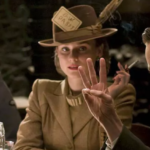I had glorious intentions of blogging every day this week, to such a degree that I actually sat down and wrote 3/4 of a post on Monday Night, but—girl you know it’s true—I had to drop my life most unexpectedly, and learn how to take care of a sick bunny. I don’t know anything about bunnies, except that they are adorable and that they seem super happy outside. Inside bunnies heretofore have remained a complete mystery to me. However, we have a person in our church who isn’t doing very well (if you want to spare some prayers for her) and has, in a month, lost her home and most of the things that make life comfortable. We’ve been taking care of her cat since St. Lucy’s day which I know because the herself is named Lucy. Now her bunny, Bella, has come into our lives for who knows how long. This is because Bella developed what the vet thinks is vertigo on Monday night, and therefore needs two kinds of antibiotics and special food administered through a syringe and the person who was taking care of her is trying to move house…do I need to go on?
So anyway, now that I’ve gotten the medicine partly on the rabbit and partly on myself, let me return to the subject that had been occupying me on Monday Night, which is how I am an advice magnate. There’s something about me that says, “This person doesn’t have a clue what she is doing. I should help her by telling her what to do.” So I was happy to discover that the important subject of Advice is finally getting the attention of the New York Times. Lots of people today—you may have noticed this, I certainly have—seem wholly unable to figure out what to do with themselves. Lately, I’ve attributed this phenomenon to the loss of (I do love this phrase) “unchosen obligations.” Ordinary people don’t have a sense of externally verifiable reality nor identity conferred on them by people who, in bygone times, would have been part of their lives whether they liked it or not. The choice of who to be and who to be with didn’t come up. This might seem cruel or unkind to us today. How could those poor fools even live like that? But in reality, it meant that most people weren’t struggling with enormous mental and emotional issues, untethered, bobbing about the internet sea trying to sort themselves out. What is a person to do, now, if she doesn’t know who she is or what to do with herself? Well, she can go get advice from some people:
I wanted practical guidance that I could quickly put into effect in my life. But the immediate value of suggestions, I learned, wasn’t simply doing what others said. They can be a tool for self-discovery, a mirror to reflect on our beliefs and blind spots. Input from others elicits the opportunity to think something over. By determining if it is something we want, and if it matches our desires or values, we’re forced to name what our desires and values are in the first place.
Mmmm, yes. It always has to be about more self-discovery, that depressing and boring search for happiness. And remember! If you forget about yourself and your search for yourself for one single moment, the internet will literally not know what to do. Here’s a person who figured out a new way to get advice:
In the fall, the University of Chicago philosopher Agnes Callard, who specializes in ancient philosophy and ethics and is known for her popular essays on philosophy, created a virtual suggestion box. Dr. Callard often receives suggestions on Twitter and wanted a centralized place to collect them. A link in her bio takes users to a Google form, prompting them to answer the question: “How should I improve?” So far, Dr. Callard has received plenty of suggestions for what to read and write. Recently, she followed a suggestion to read a sermon by Herbert McCabe, the theologian, and said she liked its exploration of the relationship between prayer and self-knowledge.
Yeah, that’s what prayer is for. More self-knowledge. It can’t ever, not even for a moment, just to repeat myself, be for any other reason, like communing with the Divine or discovering something about someone else, like God or the Universe or Whoever.
This is my favorite bit:
In lab experiments, participants tend to privilege their own perspectives. This is called “egocentric advice discounting,” said Silvia Bonaccio, a professor of workplace psychology, who studies how advice is given, or ignored, in the workplace. Our own initial decisions or ideas act as an anchor and stop us from following advice.
I’m so sorry, Professor Bonaccio, but you can’t avoid “egocentric advice discounting” in a world where pursuing your own self-knowledge is the highest, most honorable good. That’s like thinking you can get thin and eat as much chocolate as you like. I mean, intuitively, a lot of us also “know” that if we just eat more chocolate, we will get thin, and that if we spend more time thinking about ourselves we will necessarily become happier, and that if we scroll a little bit farther on Facebook we will escape the ennui, that’s literally what we think, no matter what expert “advice” we might trip over. So anyway, I’m adding “egocentric advice discounting” to my store of stupid words. My collection for 2023 is off to an epic start. We carry on:
Dr. Callard believes there’s a difference between suggestions, advice and instructions.
Is that like a personal belief? Or is there some empirical data to substantiate her thoughts and feelings? On the other hand, it doesn’t matter because nothing matters:
Instructions tell you how to get something that you already know you want and is concrete: how to find a bus stop, how to assemble a piece of furniture, how to un-jam the copy machine. And mentorship, or coaching, she said, is less about advice-giving and more about building a relationship based on interpersonal knowledge. If Dr. Callard is mentoring a student, she can guide them toward their goals because of how much she knows about them. “I view it as something more intimate and robust than advice,” she said.
Well, that’s sweet. I don’t view it as anything because I don’t care very much. But still, we’ve come this far, we can’t give up now:
The suggestion box process is about receiving random guesses about what we might enjoy, she says. Advice, on the other hand, Dr. Callard views as coming from someone who purports to be in a position to know what you should do.
Yeah, which is what makes it so strange. Even more so when you consider how many people are willing to change the course of their lives based on the latest up-and-comer who happens to make it onto the New York Times bestsellers list, like Brianna Wiest.
I do find Wiest fascinating. How does she know all that she knows? And she does know a lot. She is able to make astonishing statements about the nature of all things, in a breezy unconcerned way, as if she was there at the foundation of the world, when the earth was without form, when God spoke. Here’s some astonishing, authoritative information that must be true because of course it is:
There are many reasons we self-sabotage, and most of them have something to do with comfort. Modern society (innovation, culture, wealth, success) is designed to convince us that a “good life” is one that is most comfortable, or able to provide us with a sense of being pain-free and secure. This is pretty directly related to the fact that human beings are hardwired to seek comfort, which translates to us as survival— we’re physiologically designed that way. It only makes sense that in our more fully actualized intellectual and emotional lives, we’d want the same. Moving yourself past resistance is a matter of shifting your perception of comfort. It’s about considering the alternative. It’s altering your mindset to focus on the discomfort you will face if you don’t do the thing in front of you, as opposed to the discomfort you will face if you do. If left unchecked, the knowing-doing gap will leave you a shell of the person you intended to be. It will wreck your most intimate, passionate relationships, keep you from the kind of daily productivity required to achieve any goal worth working toward. (p 61-62 Kindle Edition)
How does she know all that? There are no footnotes. Did she take a bunch of classes in psychology? Did God tell her in the darkness of the night? Or the Universe? What is the “knowing-doing gap?” Is that the stupid idea that “if you know better you do better” which is one of those wondrously alluring lies that we can’t help but believe?
Imagine reading a book like that and thinking it would really help you. I mean—really, imagine it because lots and lots of people are doing it every day.
Here’s my advice. Commit yourself to a life of unchosen obligations, where your commitments to particular people have greater weight in your quotidian arrangements than your own inclinations and desires. Take your eyes off of yourself for a few minutes and what you should do will become much more obvious. You’ll find yourself doing things that bind you to the people to whom you owe honor, love, and care. You won’t have time to think about yourself all the time, which is the greatest of all time sucks in the history of human people. And now, if you’ll excuse me, this bunny seems up for a nibble of lettuce.
Have a nice day…or rather, I wouldn’t presume to advise you, have whatever kind of day you prefer.
Photo by Kenny Eliason on Unsplash






